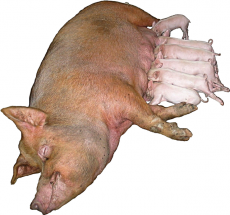Genetics
Pigs and Chimpanzees Living in Sin?
Well, would you believe that pigs mating with chimpanzees produced humans?
Posted November 30, 2013

Ah, the Daily Mail.
For no reason that anyone can figure out, the writers at the Daily Mail today decided to resurrect a crazy "science" story that first appeared this summer. As they headlined the story
'Humans evolved after a female chimpanzee mated with a pig': Extraordinary claim made by American geneticist
I want to officially disclaim any intent to advance the arguments of the author of this highly original, completely implausible, proposal. Described as a recipient of a PhD in genetics, he clearly is operating outside of the mainstream, although he has published about hybridization-- among birds.
But the story is making the rounds on the internet, on social media, and has been picked up by some widely scattered tabloid press. And when I laughed out loud about it, one of those present reported having read that humans and pigs share most of their DNA, and another listener added that pigs are the preferred physiological model for humans.
So let's start with debunking: go read this post on the Observation Deck website. If you want more explanation check out P. Z. Myers' original response back in July.
Don't worry, I'll wait for you.
Back? Good. To summarize: a random list of comparisons between humans and pigs, combined with zero discussion of the actual genomes of the three species involved, ends up inspiring my favorite British tabloid.
But then there's that other thing, what made two listeners push back against my immediate hilarity over this comparison.
Don't pigs and humans have a lot of DNA in common? aren't pigs physiologically more like humans than any other animal?
In 2010, Chris Moran, described as Professor of Genetics at the University of Sydney (who seems since to have retired), fielded a question on an Australlian news website:
I heard that pigs share 98 per cent of human genes. Is this correct?
His answer, if I boil it down inelegantly, was that both species share a large amount of genetic code that all mammals have in common, but the rest of the DNA is highly divergent (highlighting added):
"If we compare really closely related species, like a human and chimpanzee, we can still see the similarity between these rapidly changing sequences. If you move further away to the more distantly related pig, so many changes in the DNA will have occurred that it is no longer possible to recognise that the sequences were ever similar.
"Depending upon what it is that you are comparing you can say 'Yes, there's a very high degree of similarity, for example between a human and a pig protein coding sequence', but if you compare rapidly evolving non-coding sequences from a similar location in the genome, you may not be able to recognise any similarity at all."
A European Research Council report on grants funded in 2009 and 2011 examining evolution of the domestic pig starts with a promising statement-- "The pig and its cousin the wild boar share a lot with humans"-- but then gets down to actual science. These scientists studied "the pig genome in parallel with those of the human, mouse, dog, horse and cow":
The new analysis also supports the use of the pig as a model in studies of human diseases such as e.g. obesity, diabetes, dyslexia, Parkinson’s disease and Alzheimer’s disease. In total, the team found 112 positions where the porcine protein has the same amino acid that is implicated in a disease in humans. “
Pigs work well as a model not because they share so much of the genome with humans-- since most of that sharing is basic mammalian heritage-- but because pigs and humans have specific genetic sequences that produce specific amino acids that humans also produce. In 2012 Nature summarized some of the specific ways that pigs are better models than other commonly used laboratory animals-- specifically, mice.
Pigs are better models than mice or other commonly used lab animals, such as dogs, because of specific features that are not simply genetic. Pigs, like humans, are omnivores. So pigs are susceptible to some of the conditions induced by the human diet. In fact, most of the lists I have found of reasons why the pig is a preferred physiological model flow from this shared behavior. To quote Kristy Kuzmuk and Lawrence Shook's article "Pigs as a Model for Biomedical Sciences" in the 2010 Genetics of the Pig,
"The pig is also one of the few animals that will voluntarily eat to obesity, as well as being susceptible to alcoholism."
And in fact, there are significant differences between pigs and humans-- even if our shared bad habits sometimes make pigs a good model for our diseases.
For example, in the conclusion of his comments on pigs and humans, Professor Moran of Sydney University noted one key problem that affects the success of using pig tissues for transplants:
"[The success of pig-human transplants] has very little to do with whether there's a two per cent or 20 per cent difference in the genome sequence — if those numbers actually meant anything anyway — the main barrier is caused by just one gene," says Moran.
That gene is called galactose-alpha-1,3,galactotransferase — gal-transferase for short. All mammals except humans and higher apes have a working version of gal-transferase, which coats cells with an antigen (a molecule that our immune system reacts to). This means if pig tissue is transplanted into humans our immune system will mount a drastic rejection response as our bodies detect the antigen and attack it.
Humans and higher apes share this unique feature. That is because humans and great apes-- including the poor bonobo-- evolved from common ancestors.
Pigs weren't part of that lineage. This is a fact, established by comparative research on genomes. Humans are closely related to chimpanzees (and gorillas), with whom we share this missing gene. We simply aren't particularly close, genetically, to pigs. And that means we aren't the offspring of cross-species sexual relations.




